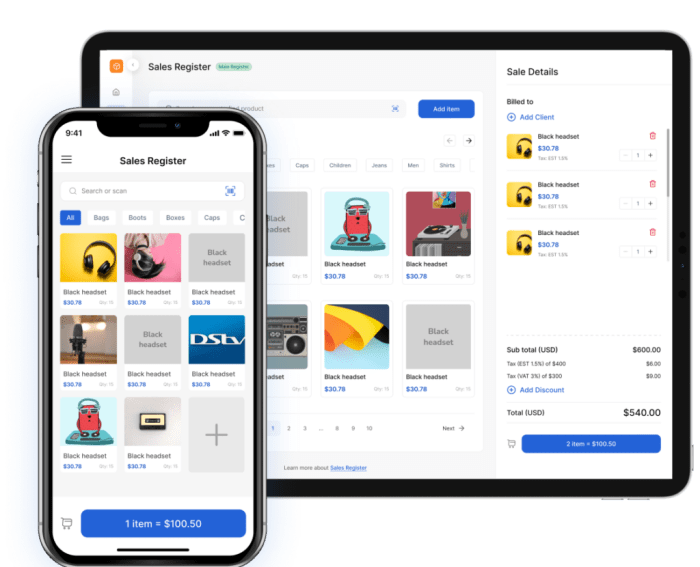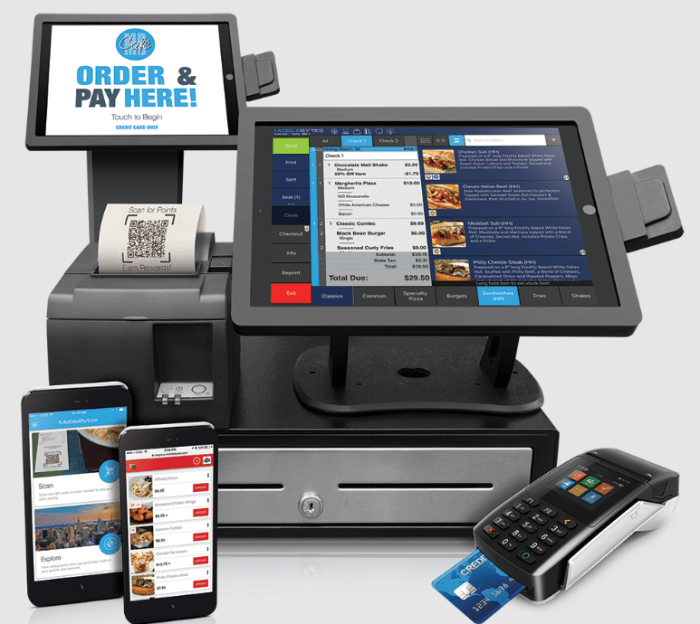Point of Sale software systems have revolutionized how businesses manage transactions, transforming from simple cash registers to sophisticated tools that streamline operations and enhance customer experience. These systems offer a range of functionalities, from inventory management and sales tracking to customer relationship management (CRM) and employee scheduling. Understanding the capabilities and benefits of a POS system is crucial for businesses of all sizes aiming to optimize efficiency and boost profitability.
The evolution of POS systems reflects the broader technological advancements in retail and hospitality. Early systems focused primarily on basic transaction processing, while modern systems leverage cloud computing, mobile technology, and data analytics to provide businesses with real-time insights and powerful decision-making tools. This shift has allowed businesses to personalize customer interactions, improve supply chain management, and gain a competitive edge in today’s dynamic market.
In today’s dynamic retail landscape, a robust Point of Sale (POS) system is no longer a luxury but a necessity. From small boutiques to large-scale enterprises, POS systems streamline operations, enhance customer experiences, and provide valuable data-driven insights. This comprehensive guide delves into the intricacies of POS software, exploring its features, benefits, selection criteria, and future trends. We’ll cover various aspects, from basic functionalities to advanced analytics, ensuring you gain a complete understanding of this crucial business tool.
Understanding Point of Sale (POS) Systems: Core Functionalities
At its core, a POS system is a computerized system designed to manage sales transactions. However, modern POS systems extend far beyond simple cash register functionality. They integrate various crucial components to optimize business processes. Let’s explore the key features:
Essential POS Features:, Point of sale software system
- Sales Transaction Processing: This includes recording sales, processing payments (cash, credit/debit cards, mobile wallets, etc.), issuing receipts, and managing returns.
- Inventory Management: Tracking stock levels, managing low-stock alerts, automating reordering processes, and providing real-time inventory visibility.
- Customer Relationship Management (CRM): Collecting customer data, managing loyalty programs, personalizing interactions, and building stronger customer relationships.
- Reporting and Analytics: Generating sales reports, analyzing sales trends, tracking key performance indicators (KPIs), and gaining insights into business performance.
- Employee Management: Managing employee schedules, tracking employee performance, assigning roles and permissions, and processing payroll.
- Payment Processing Integration: Seamless integration with various payment gateways to ensure secure and efficient payment processing.
Types of POS Systems: Choosing the Right Solution: Point Of Sale Software System
The POS system market offers a wide range of solutions tailored to different business needs and scales. Understanding the various types is crucial for making an informed decision.
Cloud-Based POS Systems:
Cloud-based systems store data on remote servers, offering accessibility from anywhere with an internet connection. They typically require a monthly subscription fee but eliminate the need for on-site server maintenance.
On-Premise POS Systems:
On-premise systems store data on a local server within the business. They offer greater control over data security but require investment in hardware and ongoing maintenance.

Source: vencru.com
Mobile POS Systems:
Mobile POS systems utilize tablets or smartphones to process transactions, offering flexibility and portability. They are particularly beneficial for businesses with mobile sales operations, such as food trucks or pop-up shops.
Integrated POS Systems:
Integrated POS systems connect to other business software, such as accounting, inventory management, and CRM systems, creating a unified business platform. This integration streamlines operations and enhances data consistency.
Benefits of Implementing a POS System
Investing in a robust POS system offers numerous benefits that contribute to business growth and efficiency. These include:
- Increased Sales and Revenue: Streamlined checkout processes and efficient inventory management lead to increased sales.
- Improved Customer Experience: Faster checkout times and personalized interactions enhance customer satisfaction.
- Reduced Operational Costs: Automation of tasks and reduced manual errors minimize operational expenses.
- Better Inventory Management: Real-time inventory tracking minimizes stockouts and overstocking.
- Enhanced Data-Driven Decision Making: Detailed sales reports and analytics provide valuable insights for strategic decision-making.
- Improved Security: Secure payment processing and data encryption protect sensitive information.
Selecting the Right POS System: Key Considerations
Choosing the right POS system requires careful consideration of various factors. Key aspects to evaluate include:
- Business Size and Needs: Select a system that aligns with the scale and specific requirements of your business.
- Budget: Consider both initial investment costs and ongoing subscription fees.
- Features and Functionality: Ensure the system offers the necessary features to support your business operations.
- Integration Capabilities: Assess the system’s ability to integrate with other business software.
- Scalability: Choose a system that can adapt to your business growth.
- Customer Support: Ensure reliable technical support is available.
- Security: Prioritize systems with robust security measures to protect sensitive data.
Future Trends in POS Systems
The POS system landscape is constantly evolving. Emerging trends include:
- Increased use of Artificial Intelligence (AI): AI-powered features, such as predictive analytics and automated customer service, are becoming increasingly common.
- Enhanced Mobile POS Capabilities: Mobile POS solutions are becoming more sophisticated and integrated with other business systems.
- Growing Importance of Omnichannel Integration: POS systems are increasingly integrated with online platforms to create a seamless omnichannel experience.
- Focus on Data Security and Compliance: Data security and compliance with industry regulations are becoming paramount.
- Rise of Cloud-Based POS Solutions: Cloud-based POS systems are gaining popularity due to their accessibility and scalability.
Frequently Asked Questions (FAQ)
- Q: What is the cost of a POS system? A: The cost varies significantly depending on the features, type of system (cloud-based vs. on-premise), and vendor. Expect costs ranging from a few hundred dollars to several thousand dollars.
- Q: How long does it take to implement a POS system? A: Implementation time depends on the complexity of the system and the size of the business. It can range from a few days to several weeks.
- Q: Do I need training to use a POS system? A: Most vendors provide training resources, including tutorials, documentation, and sometimes on-site training. The level of training required depends on the system’s complexity.
- Q: What are the key benefits of a cloud-based POS system? A: Cloud-based systems offer accessibility from anywhere, automatic updates, reduced IT maintenance, and scalability.
- Q: How can I choose the right POS system for my business? A: Consider your business needs, budget, desired features, and integration capabilities. Research different vendors and compare their offerings.
- Q: What is the difference between a POS system and a cash register? A: A cash register is a basic device for processing transactions, while a POS system is a comprehensive software solution that integrates various functionalities, including inventory management, customer relationship management, and reporting.
References
For further information, you can refer to these reputable sources:
Call to Action
Ready to transform your business operations with a powerful POS system? Contact us today for a free consultation and let us help you find the perfect solution to meet your specific needs. We’ll guide you through the selection process, ensuring a seamless implementation and maximizing your return on investment.
In conclusion, the implementation of a point of sale software system represents a significant step towards modernizing business operations. From optimizing daily transactions to providing valuable data-driven insights, these systems offer a multitude of benefits that contribute to increased efficiency, improved customer satisfaction, and ultimately, greater profitability. The continued evolution of POS technology ensures that businesses can adapt to changing market demands and remain competitive in the long term.
Commonly Asked Questions
What are the different types of POS systems?
POS systems can be broadly categorized as cloud-based, on-premise, or hybrid. Cloud-based systems offer accessibility from anywhere, while on-premise systems require local server installation. Hybrid systems combine elements of both.
How much does POS software cost?

Source: plazsales.com
The cost varies widely depending on features, vendor, and subscription model. Expect a range from free (with limited functionality) to several hundred dollars per month for comprehensive solutions.
What are the key features to look for in a POS system?
Essential features include inventory management, sales reporting, payment processing integration, customer relationship management (CRM), and employee management capabilities. Consider scalability and integration with existing business software.
How secure is POS data?
Reputable POS providers prioritize data security with encryption and other measures to protect sensitive customer and financial information. However, it’s crucial to choose a vendor with a strong security track record and comply with relevant data protection regulations.
